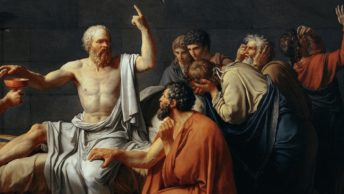 I have been an admirer of Michelle Rhee ever since she was appointed the chancellor of the Washington D.C. School System in 2007. Her Herculean task at the time was to turn the most dysfunctional school system in America into a functional one. With great courage, she fired ineffective teachers and principals, eliminated the tenure system, cut the size of the administration, closed numerous underachieving schools, and instituted merit pay. During her reign, test scores began to inch upward, reversing a decades-long trend.
I have been an admirer of Michelle Rhee ever since she was appointed the chancellor of the Washington D.C. School System in 2007. Her Herculean task at the time was to turn the most dysfunctional school system in America into a functional one. With great courage, she fired ineffective teachers and principals, eliminated the tenure system, cut the size of the administration, closed numerous underachieving schools, and instituted merit pay. During her reign, test scores began to inch upward, reversing a decades-long trend.
When her book Radical: Fighting to Put Students First, was released this year, I eagerly bought a copy. It’s an interesting read that clearly shows why so many public schools in America are miserable failures. She places most of the blame for this disgraceful situation on special interest groups, teacher unions, and members of both political parties. For anyone even mildly interested in America’s education woes, this book is a necessity.
However, there’s a short piece in the book that left me flummoxed. She writes:
I voted for [Obama]. He hasn’t disappointed. I did not think that I’d live to see the day when a prominent Democrat would say the kinds of things Obama has declared about education. He’s been clear and consistent since day one. His willingness to support charter schools and the fact that he has said that we need to reward highly effective teachers and move ineffective teachers out of the profession has moved the needle . . . And there is no doubt Obama’s key education initiative, Race to the Top, has catalyzed legislative changes the likes of which we’ve never seen.”
Now Ms. Rhee admits that she is a life-long Democrat, but what disturbs me is that she, like so many Americans, simply accepts the President’s words without seriously looking at the reality. Yes, Obama supports charter schools, but to see him as an agent of education reform is an inexplicable kind of blindness.
What do we discover when we look beyond Obama’s sound bites? Is he really going to take on the obstructionist teacher unions? In a 2010 interview, he said, “I have said to [teacher unions] . . . is we want to work with you. We’re not interested in imposing changes on you.” Well, keeping the status quo doesn’t sound like reform to me.
In the 2010 D.C. Democratic mayoral primary, the teachers’ union spent over a million dollars to defeat incumbent mayor Adrian Fenty, the man who had hired Ms. Rhee and who had courageously supported all her reforms. Fenty sought Obama’s endorsement as a clear sign that the President also supported the reforms. But Obama remained neutral, delivering a severe blow to Fenty’s reelection chances. When Fenty lost, Ms. Rhee had to resign. It was a stab in the back that would have made Brutus proud.
As for Race to the Top, Huffington Post contributor Maria Voles Ferguson, writes, “While the . . . Race to the Top program has been widely praised (despite no formal evaluation data to consider yet) — [emphasis mine], the [Education Department’s] granting of NCLB (No Child Left Behind) waivers has raised many concerns, especially as it pertains to holding schools and states accountable for student achievement.” Citing a study by the Center on Education Policy at George Washington University about these waivers, Ferguson concludes, “[T]here is less transparency to educators and the public about how students are doing.” Yet student achievement transparency is a major part of Ms. Rhee’s reform philosophy.
But the biggest example of Obama’s duplicity when it comes to education is the Opportunity Scholarships, which provide vouchers for D.C. parents so they can send their children to excellent private schools. Ms. Rhee, although a skeptic at first, changed her mind about the scholarships after talking with many mothers who simply wanted their children to have a chance at succeeding. Rhee writes:
“Who am I,” I thought, “to deny this mom and her child an opportunity for a better school, even if that meant help with a seventy-five-hundred-dollar voucher . . . especially since I don’t have a high-quality DCPS alternative?”
To her credit, Ms. Rhee is still a strong advocate for vouchers. So how can she ignore the President’s record on the Opportunity Scholarships? In his first budget in 2009, Obama proposed cutting all funding for the program and to prohibit students from receiving new scholarships. In his 2011 budget, the President wanted to cut program funding by 25%. However, Congress restored the program and even increased the money available for such scholarships. Obama’s 2013 budget includes no new money for the program and no funding in the future. Clearly, he wants the Opportunity Scholarships to go away. When Ms. Rhee was asked to respond to Obama’s opposition to school choice, she said, “I . . . want choice not to be reserved for those who can afford it. I want choice to be available to all families.” So, then, why the gushing support for the President?
When we push aside the phony rhetoric, this is what we find. Obama opposes any serious changes to improve teacher quality, he stood on the sidelines and let the teacher union candidate defeat the reform-minded mayor, his unevaluated Race to the Top initiative will likely enable school districts to hide inadequacies from the public, and he wants to destroy a voucher system that gives the poorest D.C. children a chance to succeed in life, while his own daughters attend one of the best private schools in Washington. Can anyone in the class spell hypocrisy?
Michelle Rhee is a smart, talented, courageous education reformer. It is a disservice to other reformers and to herself to blindly believe the words of the President. When it comes to education, he deserves a D–at best.








